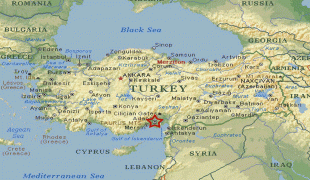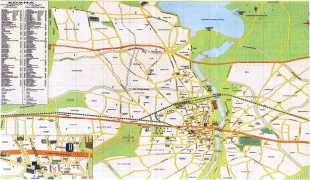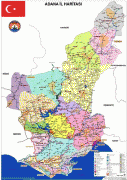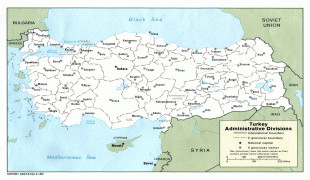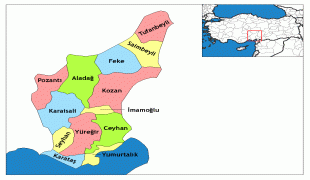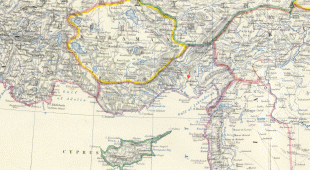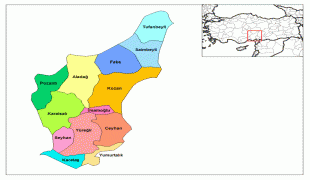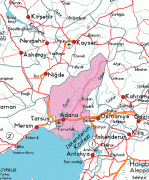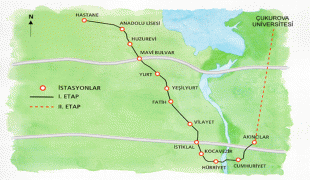Adana
Adana (Ադանա; Άδανα) is a major city in southern Turkey. It is situated on the Seyhan River, 35 km inland from the Mediterranean Sea. The administrative seat of Adana province, it has a population of 2.26 million.
Adana lies in the heart of Cilicia, which was once one of the most important regions of the classical world. Home to six million people, Cilicia is an important agricultural area, owing to the large fertile plain of Çukurova.
Twenty-first century Adana is a centre for regional trade, healthcare, and public and private services. Agriculture and logistics are important parts of the economy.
Adana Şakirpaşa Airport is close to the city centre, and the town is connected to Tarsus and Mersin by TCDD train.
One theory holds that the city name originates from a hypothetical Indo-European term; a danu (on the river). Many river names in Europe were derived from the same Proto-Indo-European root: Danube, Don, Dnieper and Donets. The first mention of Adana came in Hittite tablets of around 2000 BC. In existence for at least four millennia, Adana is one of the oldest continuously used place names and has had only pronunciation changes despite changing political control.
Greco-Roman legend suggests that the name of Adana originates from Adanus, the son of the Greek god Uranus, who founded the city next to the river with his brother Sarus, whose name was given to the river. An older legend, in Accadian, Sumerian, Babylonian, Assyrian and Hittite mythologies, attributes the name to the storm and rain god, Adad, who lived in the surrounding forests. Hittite manuscripts found in the area reported the legend. The locals had great admiration for the god and called the region Uru Adaniyya (English: Adana region) in his honour. The city inhabitants were called Danuna.
In Homer's Iliad, the city is mentioned as Adana. For a brief period during the Hellenistic era, it was known as Ἀντιόχεια τῆς Κιλικίας (Antioch in Cilicia) and as Ἀντιόχεια ἡ πρὸς Σάρον (Antioch on Sarus). On some cuneiform tablets, the city name was given as Quwê, while some other sources call it Coa which could be the place where Solomon obtained his horses according to the Bible (I Kings 10:28; II Chronicles 1:16).
It is also sometimes suggested that the name is related to the Danaoi, the name for Greeks of the Trojan War in Homer and Thucydides.
Under Armenian rule, the city was known as Ատանա (Atana) or Ադանա (Adana).
According to Ali Cevad's Memalik-i Osmaniye Coğrafya Lügat (English: Ottoman Geographical Dictionary), Muslims of Adana attributed the city's name to Ebu Süleym Ezene, who was appointed as Wali by Abbasid Caliph Harun al-Rashid. Other Ottoman and Islamic resources also mention the city as Edene, Azana and Batana.
Adana lies in the heart of Cilicia, which was once one of the most important regions of the classical world. Home to six million people, Cilicia is an important agricultural area, owing to the large fertile plain of Çukurova.
Twenty-first century Adana is a centre for regional trade, healthcare, and public and private services. Agriculture and logistics are important parts of the economy.
Adana Şakirpaşa Airport is close to the city centre, and the town is connected to Tarsus and Mersin by TCDD train.
One theory holds that the city name originates from a hypothetical Indo-European term; a danu (on the river). Many river names in Europe were derived from the same Proto-Indo-European root: Danube, Don, Dnieper and Donets. The first mention of Adana came in Hittite tablets of around 2000 BC. In existence for at least four millennia, Adana is one of the oldest continuously used place names and has had only pronunciation changes despite changing political control.
Greco-Roman legend suggests that the name of Adana originates from Adanus, the son of the Greek god Uranus, who founded the city next to the river with his brother Sarus, whose name was given to the river. An older legend, in Accadian, Sumerian, Babylonian, Assyrian and Hittite mythologies, attributes the name to the storm and rain god, Adad, who lived in the surrounding forests. Hittite manuscripts found in the area reported the legend. The locals had great admiration for the god and called the region Uru Adaniyya (English: Adana region) in his honour. The city inhabitants were called Danuna.
In Homer's Iliad, the city is mentioned as Adana. For a brief period during the Hellenistic era, it was known as Ἀντιόχεια τῆς Κιλικίας (Antioch in Cilicia) and as Ἀντιόχεια ἡ πρὸς Σάρον (Antioch on Sarus). On some cuneiform tablets, the city name was given as Quwê, while some other sources call it Coa which could be the place where Solomon obtained his horses according to the Bible (I Kings 10:28; II Chronicles 1:16).
It is also sometimes suggested that the name is related to the Danaoi, the name for Greeks of the Trojan War in Homer and Thucydides.
Under Armenian rule, the city was known as Ատանա (Atana) or Ադանա (Adana).
According to Ali Cevad's Memalik-i Osmaniye Coğrafya Lügat (English: Ottoman Geographical Dictionary), Muslims of Adana attributed the city's name to Ebu Süleym Ezene, who was appointed as Wali by Abbasid Caliph Harun al-Rashid. Other Ottoman and Islamic resources also mention the city as Edene, Azana and Batana.
Map - Adana
Map
Country - Turkey
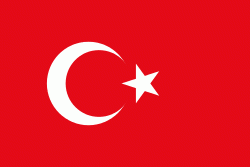 |
|
| Flag of Turkey | |
One of the world's earliest permanently settled regions, present-day Turkey was home to important Neolithic sites like Göbekli Tepe, and was inhabited by ancient civilisations including the Hattians, Hittites, Anatolian peoples, Mycenaean Greeks, Persians and others. Following the conquests of Alexander the Great which started the Hellenistic period, most of the ancient regions in modern Turkey were culturally Hellenised, which continued during the Byzantine era. The Seljuk Turks began migrating in the 11th century, and the Sultanate of Rum ruled Anatolia until the Mongol invasion in 1243, when it disintegrated into small Turkish principalities. Beginning in the late 13th century, the Ottomans united the principalities and conquered the Balkans, and the Turkification of Anatolia increased during the Ottoman period. After Mehmed II conquered Constantinople (Istanbul) in 1453, Ottoman expansion continued under Selim I. During the reign of Suleiman the Magnificent, the Ottoman Empire became a global power. From the late 18th century onwards, the empire's power declined with a gradual loss of territories. Mahmud II started a period of modernisation in the early 19th century. The Young Turk Revolution of 1908 restricted the authority of the Sultan and restored the Ottoman Parliament after a 30-year suspension, ushering the empire into a multi-party period. The 1913 coup d'état put the country under the control of the Three Pashas, who facilitated the Empire's entry into World War I as part of the Central Powers in 1914. During the war, the Ottoman government committed genocides against its Armenian, Greek and Assyrian subjects. After its defeat in the war, the Ottoman Empire was partitioned.
Currency / Language
| ISO | Currency | Symbol | Significant figures |
|---|---|---|---|
| TRY | Turkish lira | ₺ | 2 |
| ISO | Language |
|---|---|
| AV | Avar language |
| AZ | Azerbaijani language |
| KU | Kurdish language |
| TR | Turkish language |






